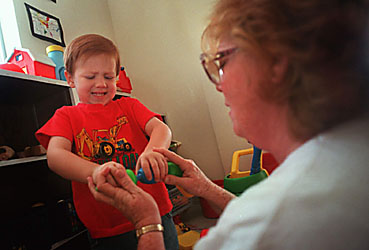 |

Julie Williams helps her adopted son Brenden "Beemer" with coordination and muscle control at a weekly play group.
![]() Adults and children with FAE suffer more mental health problems than do people with FAS. About 97 percent of people with FAE experience mental health difficulties, according to a study by the University of Washington.
Adults and children with FAE suffer more mental health problems than do people with FAS. About 97 percent of people with FAE experience mental health difficulties, according to a study by the University of Washington.
![]() "They get depressed after years and years of failing," said Tanner Halverson. "There is a high rate of suicide among these people."
"They get depressed after years and years of failing," said Tanner Halverson. "There is a high rate of suicide among these people."
![]() Seventy percent of children with FAE have school difficulties.
Seventy percent of children with FAE have school difficulties.
![]() Seventy percent of people with FAE get in trouble with the law. More than half get locked up.
Seventy percent of people with FAE get in trouble with the law. More than half get locked up.
![]() In adulthood, more than 80 percent of people with FAE cannot live independently. Seventy percent have a hard time keeping a job.
In adulthood, more than 80 percent of people with FAE cannot live independently. Seventy percent have a hard time keeping a job.
![]() And the higher their IQ, the more difficulty they have succeeding.
And the higher their IQ, the more difficulty they have succeeding.
![]() Dr. Anna Binkiewicz, a pediatrician at UMC, agreed that some physicians don't diagnose FAE for fear of labeling a child. But she worries that also denies them services.
Dr. Anna Binkiewicz, a pediatrician at UMC, agreed that some physicians don't diagnose FAE for fear of labeling a child. But she worries that also denies them services.
![]() "There are some kids in our clinics where I think, 'Should I pull this chart? Am I doing this kid a favor?' If you call it, you label that kid. If you don't call it, you may be denying services to a child who really needs them. I don't know which is more destructive."
"There are some kids in our clinics where I think, 'Should I pull this chart? Am I doing this kid a favor?' If you call it, you label that kid. If you don't call it, you may be denying services to a child who really needs them. I don't know which is more destructive."
![]() So many of the children fail in life, not understanding what is wrong with them.
So many of the children fail in life, not understanding what is wrong with them.
![]() "They are the invisible ones," said William Chambless, director of development for NOFAS, National Organization on Fetal Alcohol Syndrome, in Washington, D.C.
"They are the invisible ones," said William Chambless, director of development for NOFAS, National Organization on Fetal Alcohol Syndrome, in Washington, D.C.
![]() "There are some Gerber babies and some very normal-looking kids who were very damaged by alcohol."
"There are some Gerber babies and some very normal-looking kids who were very damaged by alcohol."
